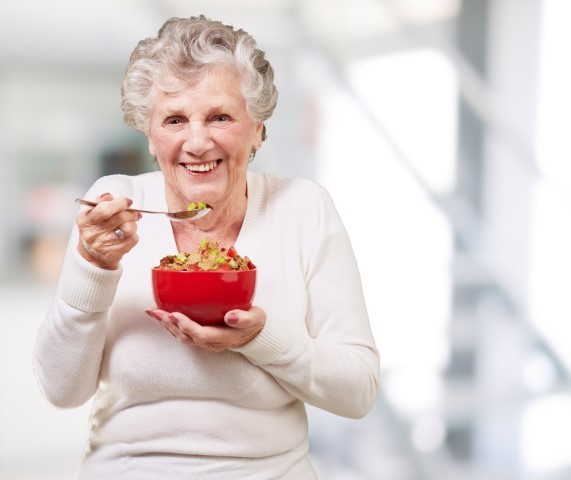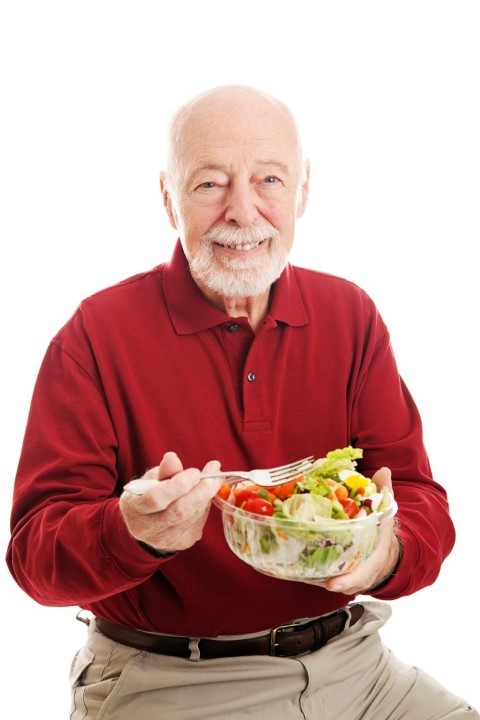Site Tech Apr 27 5 minutes, 44 seconds
530 views 0 Comments 0 Likes 0 Reviews

Diet/ Nutrition tips for the elderly

Are you a senior citizen? Do you want to be healthy? Do you want to stay healthy? Do you want to quickly recover from diseases? Right nutrition is the key. Here are tips to help you eat healthy.
While calorie requirements decrease with age, nutrition needs remain INTACT. Several factors hamper nutrition in the elderly: Age related bodily changes, Diseases, Medicines, Loneliness... If not checked on-time, malnutrition makes way for it and hampers the quality of life.
Age related bodily changes
Impaired senses
While fruits, vegetables, whole grains and healthy fats should top your list, remember to cross check labels. While buying whole wheat bread, look for 100% whole wheat. If you buy healthy, you will eat healthy.
Vision plays an important role in choosing healthy. Upgrade your glasses often. When in doubt, take a shop-keeper’s help.
Favorable aroma arouses appetite. Taste buds help you enjoy food. With an impaired smell and taste you may not be wanting to eat. On the other hand, lack of taste may prompt sugar and salt additions which hinder health.
Some medicines hamper smell and taste. Talk to your doctor.
Skin gets weak on producing vitamin D, vital for bone health.
Up your intake: Fish oil and Fish are top sources.
Few vegetarian sources: Fortified products - Milk, Cereals and Mushrooms. Mushrooms produce Vitamin D like humans. Buy mushrooms grown in sunlight specifically for the purpose of producing Vitamin D.
7other bodily changes
1.Lack of saliva
Aging decreases saliva, makes it difficult to chew and swallow.
Sip-on liquids often while having food, it will facilitate chewing and gulping.
2.Teeth trouble, Ill-fitting dentures, Mouth ulcers and Difficulty swallowing are all common.
Remember to draw quick attention to prevent malnutrition.
3.Less fire in the belly?
Gastric acid production decreases with aging. It hampers absorption of Vitamins: B12 and Minerals: Iron and Calcium.
Up your intake: Green leafy vegetables, Lean meat and Dairy are rich sources.
Talk to your doctor about supplements.
4. Loss of appetite!
Unplanned weight loss should draw attention.
Olive oil, Butter, Vinegar, Garlic, Onions, Ginger, and Spices boost your appetite.
5.Impaired bowel movements?
Impaired bowel movements are common in the elderly. Fiber rich foods: Fruits, Vegetables, Whole grains and drinking enough liquids ease bowel movements.
6.Decreased immunity!
Immunity decreases as we age. Eating foods rich in vitamin C: Citrus fruits- Orange, Limes and Lemon boost immunity and help speedy recovery.
7.Irritable, confused?
Irritability and confusion are common symptoms of dehydration in adults. Impaired thirst signals make dehydration most common in the elderly. Water is important to flush-out harmful substances; dehydration also makes way for other diseases.
Drink water every hour. Stick reminders where you spend most of your time. Clear/ light colored urine says you are well hydrated.
3 old-age diseases and Nutri-ways to prevent/ treat
1. Alzheimer’s
Alzheimer’s, a memory/ thinking disorder eventually making it difficult to carry out daily tasks.
Fish and Fish oil are rich sources of fatty acids-DHA and EPA, sure shot ways to prevent/ treat Alzheimer’s (ajcn, 85/4/929.)
3 servings of salmon/ tuna a week are great.
2.Cardiovascular diseases
Heart ailments and high BP are most common Cardiovascular diseases in elderly.
A slight modification in the elderly diet cuts down huge risk. Increasing fruit and vegetable consumption by one-two servings a day could cut-down risk by 30%!
3.Diabetes
Diabetes, the sweet disease is again more common.
Limit sugar additions. Buy products without added sugar.
Opt for nutrition dense/ low calorie foods. Fruits and certain vegetables are naturally sweet: Apples, Carrots and Oranges… A fruit milkshake is anytime a better option than adding sugar.

At our physician community, we believe in the power of purpose-driven connection.
This is more than just a network — it’s a movement to restore the excitement of the white coat. It’s a space where doctors from all specialties come together to share ideas, support one another, and spark meaningful change in healthcare.
We are united by a desire to reignite the passion that brought us into medicine — to find joy and fulfillment in our work again. Here, wellness isn’t just something we promote for our patients, but something we cultivate for ourselves. It’s a place to reconnect with purpose, rediscover your voice, and feel the strength that comes from a community of like-minded peers.
Together, we’re shaping the future of medicine — innovating, collaborating, and leading with integrity, compassion, and resilience. This is where doctors come to grow — as clinicians, as leaders, and as human beings.
Let’s bring back the spark. Let’s wear the white coat with pride — and with power.
Comments